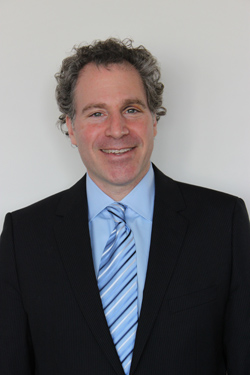March 12, 2012
David Phillips to lead Undergrad Admissions and Student Aid
By close of business on May 1, the Undergraduate Admissions and Student Aid offices will have the Homewood class of 2016 just about locked down. At 8:30 the next morning, work on admitting the class of 2017 revs into high gear.
You don’t get a lot of time to catch your breath in student recruitment at a highly selective university like Johns Hopkins.
But a part of David Phillips’ new job as vice provost for admissions and financial aid will be to make sure that everyone involved—from front-line admissions reps to the deans, provost and president—takes time out at key moments. More important, he wants them to use that time to think about strategy, reflect on the data and what it means, and decide how to use that knowledge to tweak the university’s admissions efforts.
Phillips, who coincidentally assumes his new position May 1, is a numbers guy. Don’t get him wrong: He believes wholeheartedly in the Johns Hopkins philosophy of evaluating applicants holistically, taking into consideration not just scores and grades but also essays, recommendations, involvement and other less quantifiable factors.
But he also knows that a university stashes a lot of information away in its databases during an admissions cycle. That information—if pulled back out, analyzed for patterns and trends, and shared widely—can help the admissions and financial aid staffers who recruit students, evaluate applications and administer financial aid. It can help those staffers decide what to emphasize and what isn’t working.
If, for instance, you’ve tried to appeal to a particular type of student, Phillips says, you need to know if you’ve succeeded.
“You finish yielding a class on May 1. The new year will begin on May 2,” he says. “The more time you take to bring the information together, the less time you have to look at it, analyze it and decide whether to shift what you’re doing, or feel good about what you’re doing and invest more in those directions.”
Phillips, who in 22 years in the business has become a leader in evaluating and testing admissions strategies, says that the answers are there. It’s the ability to get at them that’s the tricky part.
“Taking that data and being able to extract it fast and in nimble ways is critical,” he says. “It’s an increasingly competitive landscape for the kinds of students that Johns Hopkins and other highly selective institutions want. You need tools that put data into everyone’s hands very quickly to look at issues in multiple ways.
“It’s a framework,” he says, “that allows you to look forward. You can’t just be in the moment. You have to look forward and see what’s coming.”
Phillips’ position is a new one and reports directly to the university’s provost and senior vice president for academic affairs, Lloyd B. Minor.
“Throughout his career, David has pursued a purposeful, strategic, coordinated approach to the critical work of enrolling a talented, motivated, diverse class of undergraduates,” Minor says. “He is superbly qualified to help Johns Hopkins continue to attract students prepared to take full advantage of the unique opportunities Johns Hopkins offers.”
Phillips has been at the University of Pennsylvania since 2008, first as vice dean of admissions and now as deputy dean of admissions for strategic planning. He previously served in important roles at Columbia University, most recently as assistant dean for enrollment management services in the university’s Undergraduate Division of Student Affairs.
At Penn, Phillips has ensured that units within the Admissions Office are guided by clear, data-driven strategy and coordinate closely in pursuit of the university’s goals. He has contributed toward a 38 percent increase in applications and enhanced diversity and academic quality in the freshman class. Among other assignments at Columbia, he managed a staff of 13 responsible for strategy, data modeling and analysis, process improvement and database systems for the offices of Undergraduate Admissions, Financial Aid and Advising.
Phillips says he is pleased to be joining a highly successful university that, over the past 10 years, has consistently set new records for applications while enhancing the academic quality and diversity of entering classes. He says he looks forward to enhancing collaboration between the Admissions and Financial Aid offices, with the faculty and academic advisers, and with alumni who encourage prospective students to consider Johns Hopkins. Important to those collaborations, he says, is testing and validating even long-held assumptions about how the university can build the strongest class, and leading a full discussion of trends and issues with all involved.
“Johns Hopkins has been on a great upward trajectory,” Phillips says. “The question is how to position ourselves to continue along that trajectory. And it does take a whole university. I’m looking forward to building on our existing collaborations.”
Phillips is a 1987 graduate of Bard College.


